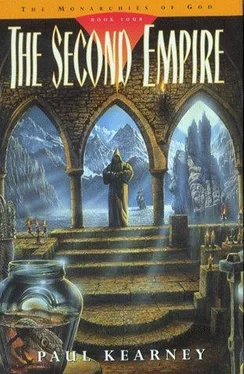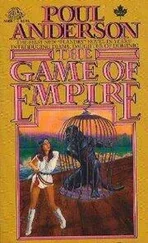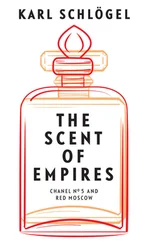Paul Kearney - The Second Empire
Здесь есть возможность читать онлайн «Paul Kearney - The Second Empire» весь текст электронной книги совершенно бесплатно (целиком полную версию без сокращений). В некоторых случаях можно слушать аудио, скачать через торрент в формате fb2 и присутствует краткое содержание. Жанр: Фэнтези, на английском языке. Описание произведения, (предисловие) а так же отзывы посетителей доступны на портале библиотеки ЛибКат.
- Название:The Second Empire
- Автор:
- Жанр:
- Год:неизвестен
- ISBN:нет данных
- Рейтинг книги:5 / 5. Голосов: 1
-
Избранное:Добавить в избранное
- Отзывы:
-
Ваша оценка:
- 100
- 1
- 2
- 3
- 4
- 5
The Second Empire: краткое содержание, описание и аннотация
Предлагаем к чтению аннотацию, описание, краткое содержание или предисловие (зависит от того, что написал сам автор книги «The Second Empire»). Если вы не нашли необходимую информацию о книге — напишите в комментариях, мы постараемся отыскать её.
The Second Empire — читать онлайн бесплатно полную книгу (весь текст) целиком
Ниже представлен текст книги, разбитый по страницам. Система сохранения места последней прочитанной страницы, позволяет с удобством читать онлайн бесплатно книгу «The Second Empire», без необходимости каждый раз заново искать на чём Вы остановились. Поставьте закладку, и сможете в любой момент перейти на страницу, на которой закончили чтение.
Интервал:
Закладка:
Heria did not look at him. She placed a hand on her swollen abdomen. “You will have a son soon, my lord. I would like him to grow up in peace. Yes, this man will never give in. He… Father Albrec told me that he had too much iron in him. But he is a good man at heart. A decent man. He will keep his word, once given.”
“Perhaps,” Aurungzeb grunted. “I must say, I have a perverse hankering to meet him, face to face. Perhaps if we sign a treaty we may pay him a state visit.” And he laughed harshly. “The times are changing, indeed.”
No-one noticed how white Heria’s face had gone. The veil was good for that much at least.
The war between the Merduks and the Ramusians had begun so long ago that no-one except the historians was sure in what year the two peoples had first come to blows. But everyone knew when it had ended: in the first year of the reign of King Corfe, the same year the Fantyr dynasty had ceased to be.
And five and a half centuries after the coming of the Blessed Saint who had also been the Prophet, the dual nature of Ramusio was finally recognised and the two great religions he had founded came together and admitted their common origin. All this was written into the Treaty of Armagedir, a document it took soldiers and scholars several weeks to hammer out in a spacious tent which had been erected halfway between the walls of Torunn and the Merduk encampment especially for that purpose.
The Merduks agreed to make the River Searil the border of their new domain. Khedi Anwar, which had once been Ormann Dyke, became the southernmost of their settlements, and Aekir was renamed Aurungabar and designated the Ostrabarian capital. The cathedral of Carcaseon was transformed into the temple of Pir-Sar, and both Merduks and Ramusians were to be allowed to worship there, since it had been made holy by the founder of both their faiths. Those Aekirian refugees who wished to return to their former home were free to do so without fear of molestation, and the monarchs of Torunna and Ostrabar exchanged ambassadors and set up embassies in each other’s capitals.
But much of that was still in the future. For now, the gates of Torunn were thrown open for the treaty-signing ceremonies, and the war-weary city made ready to receive a visit from the man who had tried to conquer it. For Corfe, it had the surreal quality of a dream. He and Aurungzeb had negotiated through intermediaries, the Sultan considering it beneath his dignity to haggle over the clauses of a treaty in person. Today he would see the face of-perhaps even shake the hand of-the man he had striven so long to destroy. And his mysterious Ramusian Queen, whose contribution to the winning of the war only Corfe and Albrec knew of. Corfe wondered how the history books would view the event. He had come to realise that the facts and history’s perception of them were two very different things.
He stood in his dressing chamber with the summer sunshine flooding in a glorious stream through the tall windows whilst half a dozen valets stood by, disconsolate. They held in their arms a bewildering array of garments which dripped with gems, gold lace and fur trimmings. Corfe had refused them all, and stood in the plain black of a Torunnan infantryman. He wore no crown, but had been persuaded to place on his head an ancient circlet of silver which at one time Fimbrian marshals had worn at the court of the Electors. Albrec, of all people, had dug it up for him out of some dusty palace coffer. It had once belonged to Kaile Ormann himself, which Corfe thought rather fitting.
Trumpets ringing out down by the city gates, heralding the approach of the Sultan’s cavalcade. It seemed to Corfe he had heard more damned trumpets blown in the past few weeks than he had heard in all his life upon battlefields. Torunn had become one vast carnival of late, the people celebrating victory, peace, a new King-one thing after another. And now this, the last of the state occasions which Corfe intended to preside over for a long time.
He’d like to take Formio and Aras out into the hills and go hunting for a while, sleep under the stars again, stare into a campfire and drink rough army wine. The war had been hellish, but it had possessed its moments of sweetness too. Or perhaps he was merely a damned nostalgic fool, destined to become a dissatisfied old man for whom all glory was in the past. Now there was a concept. The very idea made him smile. But as one of the more courageous of the valets stepped forward for the third time with the ermine-trimmed robe the smile twisted into a frown.
“For the last time, no. Now get out of here, all of you.”
“Sire, the Queen insisted-”
“Bugger off.”
“My lord, that is hardly the language a king is expected to use,” Odelia said, sweeping into the room with a pair of maids behind her.
He limped about to meet her eyes. Despite her ministrations, he suspected that his Armagedir wound had marked him permanently. He would be lame for the rest of his life. Well, many had come out of the war with worse souvenirs.
“I always thought that kings could use what language they chose,” he said lightly. Odelia kissed him on the cheek, then drew back to survey his plain attire with mock despair.
“The Sultan will mistake you for a common soldier, if you’re not careful.”
“He made that mistake before. I doubt he will again.”
Odelia laughed, something she had begun to do more often of late. The bright sunlight was not kind to the lines on her face. Whatever magicks she had once applied to maintain her youthful appearance were still being used on the wounded of the army. Her newfound age still perturbed him sometimes. So he took her hand and kissed it.
“Are they at the walls yet?”
“Just entering the barbican. Perched upon a column of elephants, if you please. It looks like a travelling circus is coming to town.”
“Well then, lady, let us go down and greet the clowns.”
Her hand came up and touched his temple briefly. “You have gone grey, Corfe. I never noticed before.”
“That was Armagedir. It made an old man of me.”
“In that case, you will not mind taking an old woman’s arm. Come. We have a dais set out for us hung with lilies, and they’re beginning to wilt in the sun. Its height has been carefully calculated: just high enough to make Aurungzeb look like a supplicant, yet not so high that he can feel insulted.”
“Ah, the subtleties of diplomacy.”
“And of carpentry.”
The crowd gave a massive roar as they appeared side by side and climbed into a carriage which would transport them to the dais just beyond the palace gates. Once there, Odelia had a final, critical look at the arrangements, and they sat down upon the thrones that awaited them. Behind them Mercadius stood, blinking like an owl in the sunlight and looking half asleep on his feet: he was to interpret the proceedings. A dozen Cathedrallers, their armour freshly painted and shining, stood about the sides of the dais like scarlet statuary.
Corfe found himself looking down a wide avenue from which the crowds were held back by two lines of Torunnan regulars. The noise was deafening and the sun hot. Odelia’s hand was cold as he gripped it, however. It felt as insubstantial as straw within his own strong fingers.
Albrec mounted the dais, his face dark with some unknown worry. He bowed. “Your pardon, Majesties. I would count it an honour if you allowed me to be present at this time. I will stay out of the way.”
Odelia looked as though she was about to refuse, but Corfe waved him closer. “By all means, Father. After all, you’re better acquainted with the Merduk Sultan than we are.” Why did the little monk look so troubled? He was wiping sweat off his face with one sleeve.
“Albrec, are you all right?” Corfe asked him quietly.
Читать дальшеИнтервал:
Закладка:
Похожие книги на «The Second Empire»
Представляем Вашему вниманию похожие книги на «The Second Empire» списком для выбора. Мы отобрали схожую по названию и смыслу литературу в надежде предоставить читателям больше вариантов отыскать новые, интересные, ещё непрочитанные произведения.
Обсуждение, отзывы о книге «The Second Empire» и просто собственные мнения читателей. Оставьте ваши комментарии, напишите, что Вы думаете о произведении, его смысле или главных героях. Укажите что конкретно понравилось, а что нет, и почему Вы так считаете.












